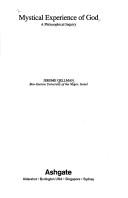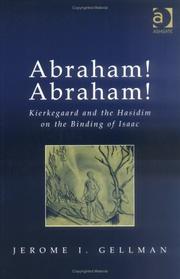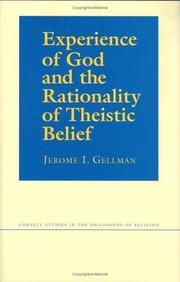| Listing 1 - 10 of 17 | << page >> |
Sort by
|

ISBN: 075461445X 0754614433 9780754614456 Year: 2001 Publisher: Aldershot: Ashgate,
Abstract | Keywords | Export | Availability | Bookmark
 Loading...
Loading...Choose an application
- Reference Manager
- EndNote
- RefWorks (Direct export to RefWorks)
Christian spirituality --- Religious studies --- Experience (Religion) --- Knowledge, Theory of (Religion) --- God --- Proof, Empirical. --- Mysticism --- Dark night of the soul --- Mystical theology --- Theology, Mystical --- Spiritual life --- Negative theology --- Epistemology, Religious --- Religious epistemology --- Religious knowledge, Theory of --- Religion --- Theology, Doctrinal --- Empirical argument --- Experience --- Religious experience --- Psychology, Religious --- Proof, Empirical --- Philosophy --- God - Proof, Empirical.

ISBN: 0754616797 Year: 2003 Publisher: Aldershot Ashgate
Abstract | Keywords | Export | Availability | Bookmark
 Loading...
Loading...Choose an application
- Reference Manager
- EndNote
- RefWorks (Direct export to RefWorks)
Hasidism --- Chasidism --- Hassidism --- Jewish sects --- Abraham --- Isaac --- Kierkegaard, Søren, --- Leiner, Mordecai Joseph, --- Mordecai Joseph Leiner, --- Lainer, Mordekhai-Yosef, --- Leiner, Mordechai Josef ben Jakob, --- Mordekhai Yosef, --- Izbitsa, Mordekhai Yosef me-, --- Mordechai Yosef, --- מרדכי יוסף, --- Isaac, --- Isaak --- Isacco --- Yitsḥaḳ --- יצחק --- יצחק אבינו --- Abraham, --- Abram --- Abramo --- Abū al-Anbiyāʼ Ibrāhīm al-Khalīl --- Abŭraham --- Avraam --- Avraham --- Avram --- Halil-ül-Rahman İbrahim --- Ibrāhīm al-Khalīl --- Ibrahim --- İbrahim, --- Khalīl Allāh --- Nabi Ibrahim --- אברהם --- אברהם אבינו --- إبراهيم الخليل --- Sacrifice. --- Bible. --- Criticism, interpretation, etc. --- History. --- Bible --- Kierkegaard, Søren --- Mordecai Joseph Leiner --- Lainer, Mordekhai-Yosef --- Leiner, Mordechai Josef ben Jakob --- Izbitsa, Mordekhai Yosef me --- -Mordechai Yosef,
Book
ISBN: 9781618111920 1618111922 9781618111708 1618111701 Year: 2012 Publisher: Academic Studies Press
Abstract | Keywords | Export | Availability | Bookmark
 Loading...
Loading...Choose an application
- Reference Manager
- EndNote
- RefWorks (Direct export to RefWorks)
Book
ISBN: 1618115200 9781618115201 9781618115195 1618115197 Year: 2016 Publisher: Boston, MA : Academic Studies Press,
Abstract | Keywords | Export | Availability | Bookmark
 Loading...
Loading...Choose an application
- Reference Manager
- EndNote
- RefWorks (Direct export to RefWorks)
Publicly or secretly, traditional Jews increasingly doubt the historical reliability of the Torah. Here, Gellman provides an "old-fashioned" Jewish theology for accepting the contemporary critique of Torah and history. Gellman presents an outline of the scholarly conclusions, and then examines faith responses and rejects apologetic attempts to evade the challenge. The book elucidates the notions of Divine Providence and Divine Accommodation that then provide a basis for the thesis that for centuries Divine Providence has been guiding toward a non-historical, non-literal understanding of the Torah. This was from God. Gellman advocates Hasidic-type non-literal approaches as most fitting for our times. Then, in light of the book's thesis, Gellman offers his understanding of Torah from Heaven, prayer, and the continuing validity of the commandments, for present-day traditional Judaism.
RELIGION / Judaism / Sacred Writings. --- Bible. --- Chumash --- Five Books of Moses --- Ḥamishah ḥumshe Torah --- Ḥumash --- Kitāb-i Muqqadas --- Mose Ogyŏng (Book of the Old Testament) --- Pentateuch --- Pi︠a︡toknizhīe Moiseevo --- Sefer Ḥamishah ḥumshe Torah --- Tawrāh --- Torà (Pentateuch) --- Torah (Pentateuch) --- Tʻoris xutʻcigneuli --- Ureta --- תורה --- Haftarot --- Criticism, interpretation, etc. --- History.
Book
ISBN: 9781618118387 1618118382 9781644691373 164469137X Year: 2019 Publisher: Boston, MA : Academic Studies Press,
Abstract | Keywords | Export | Availability | Bookmark
 Loading...
Loading...Choose an application
- Reference Manager
- EndNote
- RefWorks (Direct export to RefWorks)
That the God of the Hebrew Bible and rabbinic literature, "the God of the Jews," is perfectly good is challenged by apparently immoral acts of that God, by contemporary standards, as well as by the classic problem of evil. In this book, Jerome Gellman aims to alleviate the first challenge, the so-called ideological critique, for the traditional believer by recommending replacing the God of the Jews with a different God, a "Jewish God," one in whom many traditional Jews have come to believe. And the problem of evil is lightened for the traditional believer, mainly by a possible theodicy explaining much evil. The book is at once analytic in style and Hasidic in broad orientation.
God (Judaism) --- Orthodox Judaism --- 296*6 --- Jewish sects --- Ex-Orthodox Jews --- Judaism --- 296*6 Joodse theologie en filosofie--(algemeen) --- Joodse theologie en filosofie--(algemeen) --- Doctrines --- Doctrines. --- Critique of post-modernism. --- God. --- Hasidic Judaism. --- Hasidic thought. --- Hasidism. --- Jewish theology. --- Judaism. --- Old Testament. --- apologetics. --- belief. --- epistemology. --- evil. --- humility response. --- modern religious life. --- morality. --- perfect goodness. --- philosophy. --- possible theodicy. --- religious philosophy. --- theology. --- truth.

ISBN: 0801433207 Year: 1997 Publisher: Ithaca (N.Y.): Cornell university press
Abstract | Keywords | Export | Availability | Bookmark
 Loading...
Loading...Choose an application
- Reference Manager
- EndNote
- RefWorks (Direct export to RefWorks)
God --- Proof, Empirical
Book
ISBN: 1618111922 Year: 2013 Publisher: Boston : Academic Studies Press,
Abstract | Keywords | Export | Availability | Bookmark
 Loading...
Loading...Choose an application
- Reference Manager
- EndNote
- RefWorks (Direct export to RefWorks)
Jerome Gellman presents a new theology of the Jews as the Chosen People, addressing self-serving ethnocentric supremacy, cultural isolation, and defamation of religions other than Judaism. This book is traditional in taking chosenness and the truth of Judaism seriously, and in eschewing a theology of multiple covenants. At the same time, it is critical, rejecting previous concepts of chosenness, and innovative, offering for the twenty-first century a fresh way of seeing the Jews' place in the world. On this foundation, Gellman suggests a new approach to inter-religious understanding from a Jewish point of view, and examines the impact of his proposal on traditional Jewish liturgy.
Book
ISBN: 9798887191942 9798887191935 Year: 2023 Publisher: Boston, MA
Abstract | Keywords | Export | Availability | Bookmark
 Loading...
Loading...Choose an application
- Reference Manager
- EndNote
- RefWorks (Direct export to RefWorks)
"A sequel to Gellman's trilogy with Academic Studies Press of constructive Jewish theology, this book presents a new concept of the Jews as God's Chosen People; a reply to an argument for the reliability of Torah history; and provides an approach to the problem of evil for troubled believers and want to be believers, without trying to solve the problem"--
Book
ISBN: 9781501735400 Year: 2019 Publisher: Ithaca, NY
Abstract | Keywords | Export | Availability | Bookmark
 Loading...
Loading...Choose an application
- Reference Manager
- EndNote
- RefWorks (Direct export to RefWorks)
Multi
ISBN: 9781501735400 Year: 2019 Publisher: Ithaca, N.Y. Cornell University Press
Abstract | Keywords | Export | Availability | Bookmark
 Loading...
Loading...Choose an application
- Reference Manager
- EndNote
- RefWorks (Direct export to RefWorks)
| Listing 1 - 10 of 17 | << page >> |
Sort by
|

 Search
Search Feedback
Feedback About UniCat
About UniCat  Help
Help News
News